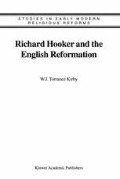Abstract
Richard hooker’s treatise Of the Lawes of Ecclesiasticall Politie begins with a comprehensive description of creation that divides the finite world into a vast variety of elements. The purpose of this description is to affirm that all of these elements work together under God’s direction; and moreover, that it is for the sake of the Good that God’s will is effective in the world.1 In order to give existential import to this theological assertion, Hooker asks his readers to imagine what a disaster it would be for human life should non-sentient beings somehow be stopped from following God’s good will.2 In Hooker’s view, God’s Goodness is not to be conceived as an abstract principle but is communicated as something active for the benefit of human beings. The law of God, while joyfully escaping precise definition, is grounded in the being of God and points toward human redemption.3 Hooker explains: “the being of God is a kinde of lawe to his working: for that perfection which God is, geveth perfection to that he doth.”4
Access this chapter
Tax calculation will be finalised at checkout
Purchases are for personal use only
Preview
Unable to display preview. Download preview PDF.
References
Richard Hooker, Of the Lawes of Ecclesiasticall Politie, in The Folger Library Edition of the Works of Richard Hooker, W. Speed Hill, General Editor (vols. 1–4, Cambridge: Belknap Press of Harvard University Press, 1977–1982), I.2.3; 1:59.28–61.6. The treatise is cited hereafter as Lawes, giving book, chapter, and section, followed by the volume, page, and line numbers found in the Folger Library Edition (FLE).
Lawes L3.2; 1:65.20–66.7: “Now if nature should intermit her course, and leave it altogether, though it were but for a while, the observation of her own lawes… what would become of man himselfe, whom these things now serve? See we not plainly that obedience of creatures unto the lawe of nature is the stay of the whole world?”
As Hooker so eloquently states: “Dangerous it were for the feeble braine of man to wade farre into the doings of the most High, whom although to knowe be life, and joy to make mention of his name: yet our soundest knowledge is to know that we know him not as in deed he is, neither can know him: and our safest eloquence concerning him is our silence, when we confesse without confession that his glory is inexplicable, his greatnes above our capacitie and reach.” Lawes I.2.2; 1: 59. 12–19
Lawes I.2.2; 1:59.5–6
Gunnar Hillerdal, Reason and Revelation in Richard Hooker ( Lund: CWK Gleerup, 1962 ), 78
Lawes L4.1; 1:70.6–11
Lawes L4.3; 1:71.20
Lawes I.4.3; 1:72.4–10
Lawes 1I.7.6; 1.181
Lawes II.7.9; 1:184.34–185.7
u For Hooker’s marginal notes on A Christian Letter (ACL) see Richard Hooker, Of the Lawes of Ecclesiasticall Politie: Attack and Response, edited by John E. Booty, ACL 4: 17. 22–29.
W. J. Torrance Kirby, The Theology of Richard Hooker in the Context of the Magisterial Reformation ( Princeton: Princeton Theological Seminary, 2000 ), 45–46
A Learned Discourse of Justification, Workes, and how the Foundation of Faith is Overthrowne in Richard Hooker: Tractates and Sermons, s.26, edited by Egil Grislis (Folger Library Edition, Cambridge MA: Belknap Press of the Harvard University Press, 1990), FLE 5:136.30–137.3 [cited hereafter as Just.]
Lawes V.63.1; 2:290.24–31
Lawes V.63.1; 2:291.3
Lawes V.63.2; 2:291.21
Peter Munz, The Place of Hooker in the History of Thought ( London: Routledge and Kegan Paul Ltd., 1952 ), 32
Lawes I11.8.4; 1:221.17–27
Lawes V.63.2; 2:291.24
Just. 26, 5:143.16–17
Just. 26, 5:141.20–142.1
Lawes V.48.10, 11; 2:198–199 zs Lawes V.48.11; 2:199.3, 4
awes V.48.11; 2:199.6, 7
Lawes V.48.12; 2:199.26
See Just. 26, 5:140.27–141.11
Philippa Berry, “Kristeva’s Feminist Refiguring of the Gift,” in Post-Secular Philosophy: between Philosophy and Theology, ed. Phillip Blond (London and New York: Routledge, 1998), 321. Kristeva writes: “Ego does not yet know how to be because he thinks… `I’ is because I love. An I that, moreover, cannot be defined, seduces in the grand manner, but does not point to itself as basic identity, split as it is between the Other and the affect. An 1 that is passion. Ego affectus est. ‘I sense that my words please you’ (Bernard of Clairvaux).” Julia Kristeva, Tales of Love, tr. Leon S. Roudiez ( New York: Columbia University Press, 1987 ), 169.
Dr Miguel Marcelino Boix y Moliner, while boasting about Spanish intellectual history, claimed in 1711 that Gomez Pereira had already anticipated Descartes in 1554. See Allen G. Debus, “Paracelsus and the Delayed Scientific Revolution in Spain: A Legacy of Philip II” in Reading the Book of Nature: The Other Side of the Scientific Revolution, ed. Allen G. Debus and Michael T. Walton ( Kirksville: Sixteenth Century Journal Publishers, Inc., 1998 ), 157.
Lawes V.67.3; 2:332.16–26
Lawes V.67.3: 2:332
Lawes V.67.3; 2:333.3–6
Lawes V.67.4; 2:334.1
See Richard Hooker, “Grace and Free Will,” Trinity College, Dublin, MS 121, Dublin Fragments 3, FLE4: 104. 11–13
Lawes I1.8.7; 1:191.22–25
Lawes II.8.6; 1:190.16–19
Just. 26, 5:137:7–10
W. David Neelands, “Richard Hooker and the Debates about Predestination: 15801600,” 48 below.
Lawes II.7.6; 1:183.13–18
Lawes I1.7.9; 1:185.2–4
Lawes I.4.1; 1:70.6–11
Lawes I.4.3; 1:72.4–10
Lawes V.57.5; 2:247.15–22
Editor information
Editors and Affiliations
Rights and permissions
Copyright information
© 2003 Springer Science+Business Media Dordrecht
About this chapter
Cite this chapter
Rasmussen, B.G. (2003). The Priority of God’s Gracious Action in Richard Hooker’s Hermeneutic. In: Kirby, W.J.T. (eds) Richard Hooker and the English Reformation. Studies in Early Modern Religious Reforms, vol 2. Springer, Dordrecht. https://doi.org/10.1007/978-94-017-0319-2_1
Download citation
DOI: https://doi.org/10.1007/978-94-017-0319-2_1
Publisher Name: Springer, Dordrecht
Print ISBN: 978-90-481-6462-2
Online ISBN: 978-94-017-0319-2
eBook Packages: Springer Book Archive

